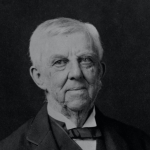1
It opens as a long lamplit evening
with Rembrandt, stretched out with the glossy book
of his Works on Paper. Brown-petal etchings and drawings:
nut-brown, browner, irreclaimable rills
of iron-gall ink sucked and feathered into
the paper's wan cusps and culverts. The ink...it's as if
there's no pulling away from the wet, flowing line
to the tiny hedge-village perched on the edge of the cliff
and the paper. Here the ink's overwatered
and we barely, down in the forested loam,
disengage the gentle saint, his rounded hat molding
his crown like thatch on low rooftrees...St. Jerome.
2
Hunched, sunk in a deep-toned wash,
he cares only for the huge, softleaved book
propped on his knees. At nightfall Jerome swallowed up
by his Bible misses the wistful look
of his lion withdrawn to the forested ridge,
the drawing's diagonal. And from there, one can say
that landscape exists: prowls and spinnies
where a lion might wind a lioness, or his prey...
He looks out on tree-clouded peaks, tiny hamlets,
two lambs in a wattle-fold. What the lion sees, we see.
For Jerome, though, the lion is Judah, his seal and seed—
Jesse's stem drops thickset leaves for him to read.
3
Saskia, of course, thrones in painting. Still,
tiny sketches tumble from odd cabinets:
the dear in a lopsided turban or twilled
garden hat, sketched "on my wedding-day"—
Saskia. A cluster of lines, a rippled race
of curls and cloudsets. And, for a rarity,
in Rembrandt, flowers. The simple, surprised, smiling face
of Saskia as Flora...After her fourth lying-in
(she was dying), he took to long walks
on the city's outskirts; his sketchbook came home
with mere touches of charcoal, a reed, a waterfowl,
estuarial shallows unfolding to the rim.
4
Now life is meaner, chaotic. Rushes of arousal,
lawsuits, debts...this print of a kitchen drab,
eyes wandering, mouth a vacant, uptilted half-lune,
her work-swollen hands on Saskia's velvet shawl,
The thighs parted, abdomen pear-pendulant,
the pulled-off stocking-stays grooved in the flab
to her copse of cross-hatchings—No one
wants to see this. But his hand made
this stock, of himself the substance and seed. Fine-
spun cosmos, brown tangle, soft sign:
the old man spares us nothing. The book,
the look, the lieu, the end of the Line.





















Comment form: